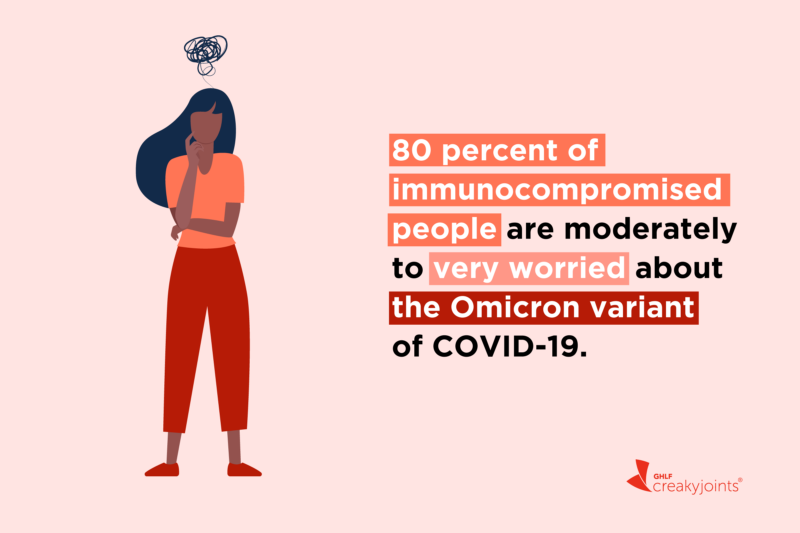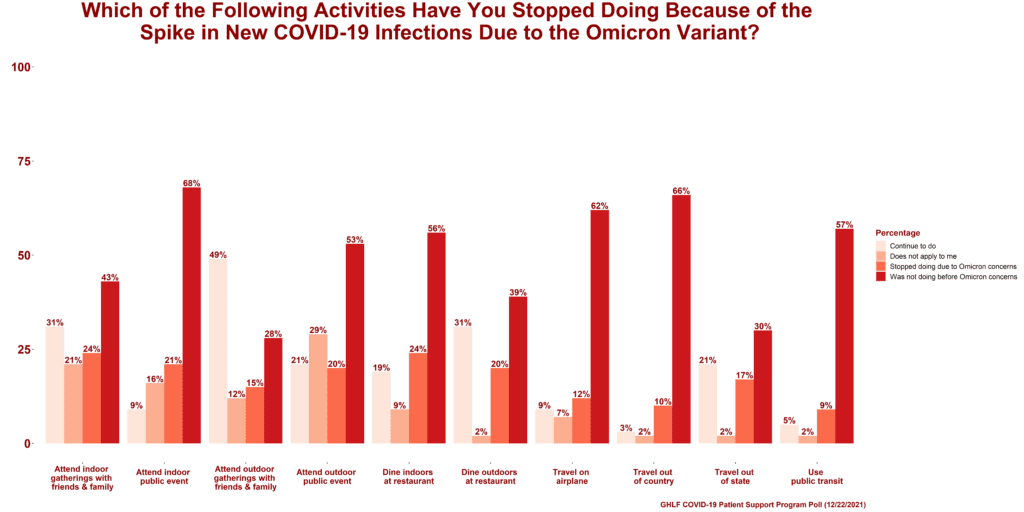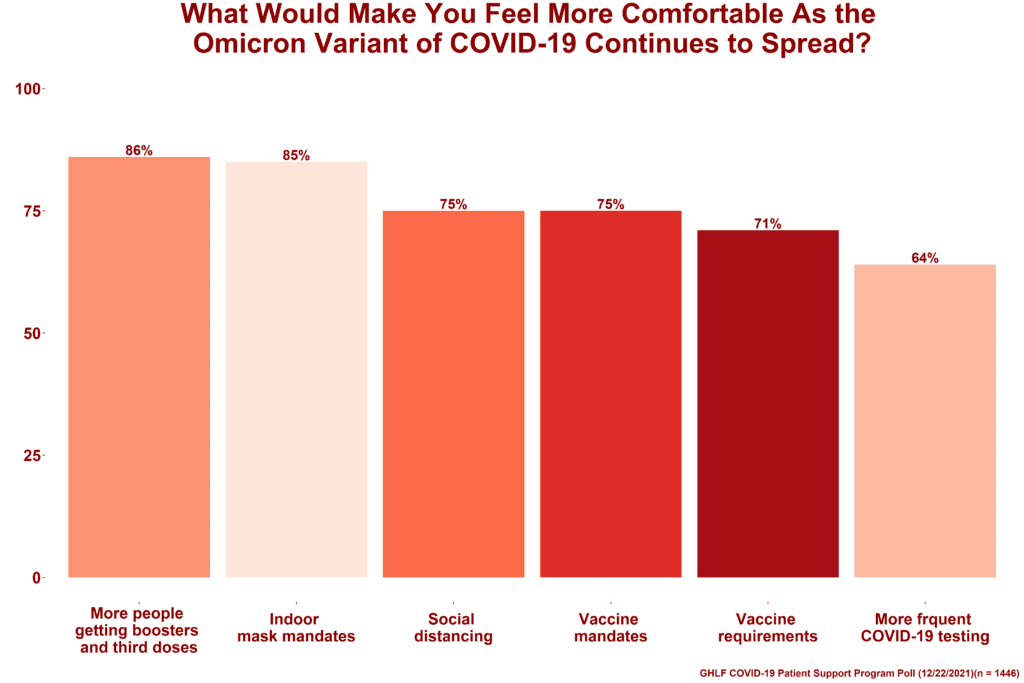Learn more about our FREE COVID-19 Patient Support Program for chronic illness patients and their loved ones.
The Omicron variant is now the dominant strain in the U.S., accounting for over 73 percent of new coronavirus cases in the last week of December 2021. First identified in South Africa, the Omicron variant is much more transmissible than previous strains of the coronavirus — it is two to three times as likely to spread as the Delta variant.
The steep and sudden rise in COVID-19 cases due to Omicron is particularly worrying for people who are immunocompromised and may still be vulnerable to COVID-19 despite being vaccinated.
Studies show that people who are immunocompromised because of inflammatory and autoimmune conditions may have a higher risk of complications and hospitalizations from COVID-19. Also, people who are immunocompromised and take certain immunosuppressant medication may not garner a full response to the vaccine.
While several studies have looked at vaccine protection specifically against an Omicron infection, and found illness from the Omicron variant seems to be milder, we are still waiting for data that is specific to immunocompromised people.
In our latest poll, the Global Healthy Living Foundation’s COVID-19 Patient Support Program aimed to gain insight into immunocompromised people’s concerns about Omicron and if the surge in COVID cases has changed their mitigations efforts or activity choices.
Of the 1,449 survey respondents (88 percent reported receiving a third dose or booster of the COVID-19 vaccine), 80 percent of immunocompromised patients said they are moderately to very worried about the Omicron variant of COVID-19.
Here are some other key learning and insights from the poll.
Many immunocompromised people are worried about the Omicron variant, despite their vaccine status and mitigation efforts
Respondents were asked to rate how worried they are about getting COVID-19 because of the new variant. Of the 1,446 who answered:
- 42% said very worried
- 38% said moderately worried
- 16% said slightly worried
- 3% said not at all worried
Immunocompromised people have stopped or continue to abstain from certain activities
We asked respondents if they are still comfortable doing certain activities, given the Omicron variant and rising COVID infection rates. There were some activities — attend an indoor public event, travel on an airplane, and travel out of the country — that many participants (60 percent or more) had not done since before there were concerns about Omicron. This is not surprising, since many in the immunocompromised patient community have continued to avoid higher-risk situations throughout the pandemic.
There were several other activities, however, that many participants said they had resumed until the Omicron variant changed things again.
For each scenario, they could choose from one of four responses:
- Stopped doing due to Omicron concerns
- Was not doing before Omicron concerns
- Continue to do
- Does not apply to me
When it comes to seeing friends and family, people are more comfortable meeting loved ones outdoors as opposed to a public event.
- 31% said they continue to attend indoor gatherings with family and friends
- 49% said they continue to attend outdoor gathering with family and friends
However, respondents have become more conservative when it comes to public events: only 9 percent continue to attend indoor public events, and only 20 percent continue to attend an outdoor public event.
Immunocompromised people are worried about access to health care
In in the free response section of the poll, many people reported being worried about their ability to get health care. “I’m extremely concerned that this surge is overwhelming our health care system and that I and my family will not be able to get treatment for COVID or other health issues for possibly the next few months,” one person wrote.
Others echoed this concern about hospitals saying, “a huge concern is overloaded hospitals. If I need care, even for non-COVID concerns, it isn’t available” and “my biggest concern is lack of hospital space.”
Some are also worried about the COVID-19 risks that health care facilities pose in general: “I am completely vaccinated and will soon be undergoing a medical procedure, which makes me even more concerned.” Another respondent said they’ve cancelled appointments because of this surge saying it, “scares me to death. Cancelled dental and medical appointments for the first time.”
Not surprisingly, more people following COVID-19 precautions would help make immunocompromised feel safer
When it comes to feeling safe in the face of Omicron, our poll results show that immunocompromised patients would feel more comfortable if others were taking COVID-19 precautions. The most important were vaccine boosters and masking:
- 86% would feel more comfortable if more people were getting boosters or third doses
- 85% would feel more comfortable if there were indoor mask mandates
Other factors that would help people feel more comfortable:
- 75% said social distancing
- 75% said vaccination mandates (i.e., employees in certain settings must be vaccinated to remain employed)
- 70% said vaccination requirements (i.e., businesses require people to show proof of full vaccination to enter)
- 64% said more frequent testing for COVID-19 infection
- 20% said other
The Omicron surge is affecting immunocompromised patients’ mental health
Our previous COVID-19 Patient Support Program poll found that only 4 percent of immunocompromised people say they are very satisfied with their ability to socialize. This rung true in this poll, with people sharing that they feel afraid, trapped, and lonely.
“It makes me so afraid,” one person wrote. “So tired of missing everything with my family and friends. Even though, I am vaccinated and boosted, my life is still the same as 2020.” Another said, “with a compromised immune system this is even scarier than before, and I feel more trapped and unsure. Early on it was easier to do nothing outside my home — now I am confused and afraid.”
Many are wondering if things will ever feel normal. One person wrote, “with the Omicron variant now with us, it is enforcing the fears of many that this pandemic is far from over. My depression is worsening.”
Immunocompromised are mainly getting their information from news outlets and public health institutions
We asked respondents where they get information about Omicron variant of COVID-19. They were given eight options and able to select all options. The most common sources:
- 86% said news outlets (TV, print, online)
- 80% said public health institutions and websites (CDC, local governments, etc.
According to the results, these are the other sources our community uses for information:
- 52% My doctor or other health care provider
- 40% GHLF’s The Health Advocates podcast
- 34% COVID-19 Patient Support Program newsletter
- 19% Friends and/or family
- 15% social media (Facebook, Twitter, etc.)
- 9% other
From the free response section of the poll, it’s clear that there is not enough information out there for immunocompromised people about Omicron, especially when it comes to additional doses of the vaccine.
One person wrote, “there should be more available discussion of risks for immune-compromised people.” Another asked, “also, its almost six months since my booster shot. Is my resistance still strong or should I get a fouth shot?” Another respondent wrote, “Would like to know about a booster or fourth shot for immune compromised people … Not comfortable because I don’t understand.”
The third shot of the mRNA vaccines (Pfizer and Moderna) was approved for immunocompromised people in August 2021, and many felt hopeful for the additional protection. You can read more about the experience of getting the third shot here.
Now, there’s talk of a fourth booster shot specifically for immunocompromised people. The U.S. Centers for Disease Control and Prevention (CDC) recommended a fourth shot for immunocompromised to be given six months after the third shot. This means that eligibility will begin in late February for those who got their third shot in August.
The Global Healthy Living Foundation is committed to providing ongoing education about COVID-19 vaccines for the chronic illness and immunocompromised community.
To stay informed about the latest COVID-19 vaccine news for people who are immunocompromised, take immunosuppressant medications, or have autoimmune conditions, follow all of our COVID-19 vaccine coverage here.
Get Free Coronavirus Support for Chronic Illness Patients
Join the Global Healthy Living Foundation’s free COVID-19 Support Program for chronic illness patients and their families. We will be providing updated information, community support, and other resources tailored specifically to your health and safety.
About the Patient Support Program Quick Poll
Members of our program have underlying health issues — such as inflammatory arthritis and other autoimmune conditions, heart disease, lung disease, diabetes, and more — that may increase their risk for COVID-19 complications. They are interested in understanding the best ways to stay safe during the pandemic and to be part of a community of people with similar concerns, questions, and fears.
We regularly poll members, who live in the U.S. as well as around the globe, about a variety of topics, including how the pandemic is affecting their lifestyle, mental health, chronic disease management, medication adherence, and more.
We use this information to inform the educational resources we provide and to inform other stakeholders — such as public health experts, policymakers, advocacy groups, health care professionals, and pharmaceutical companies — about chronic illness patients’ needs and concerns. You can participate in ongoing polls by joining the support program here.
Caldwell T, et al. Omicron Is Now the Dominant Strain of Coronavirus in the US, According to the CDC. CNN. December 21, 2021. https://www.cnn.com/2021/12/20/health/us-coronavirus-monday/index.html.
Chutel L. Illnesses Tied to the Omicron Variant May be Milder, a Preliminary Study Suggests. The New York Times. December 14, 2021. https://www.nytimes.com/2021/12/14/world/africa/omicron-south-africa-study.html.
Considerations for COVID-19 Vaccination in Moderately or Severely Immunocompromised People. U.S. Centers for Disease Control and Prevention. December 23, 2021. https://www.cdc.gov/vaccines/covid-19/clinical-considerations/covid-19-vaccines-us.html#considerations-covid19-vax-immunocopromised.
Zimmer C, et al. Omicron: What We Know About the New Coronavirus Variant. The New York Times. January 3, 2022. https://www.nytimes.com/article/omicron-coronavirus-variant.html.








